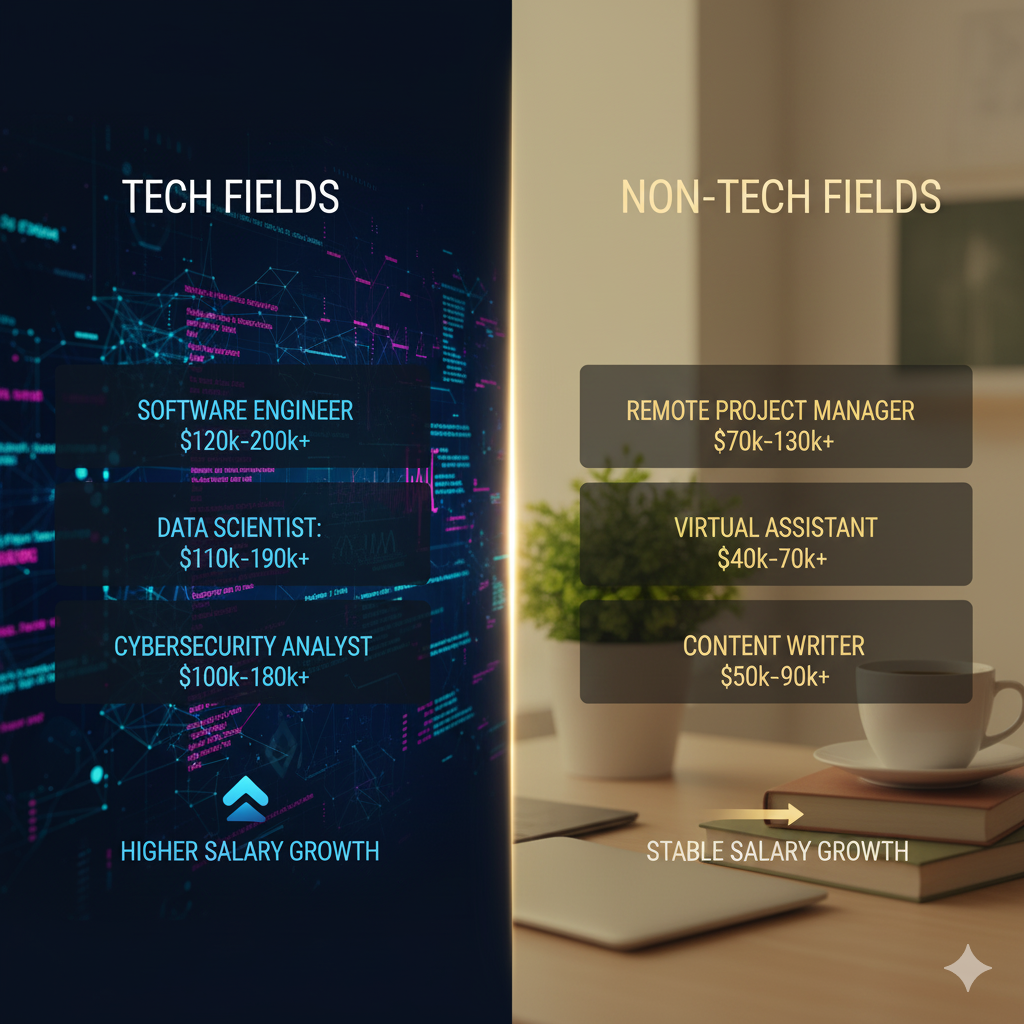Introduction
Remote work has redefined how professionals think about career growth and earning potential. While flexibility and location independence remain major benefits, the real question for many is how salaries compare across different fields. In particular, people want to understand the differences between remote job salaries in tech vs. non-tech fields.
The technology sector has long been considered the highest-paying arena for remote professionals, thanks to roles in software engineering, data science, and cybersecurity. However, non-tech industries such as healthcare, education, marketing, and finance are also offering competitive compensation as they adapt to remote-first models. This shift means that building a rewarding career no longer depends solely on working in tech. Remote work has redefined how professionals think about career growth and earning potential. Today, conversations often revolve around remote job salaries in tech vs. non-tech fields, as workers want to know which industries offer the best pay while still providing flexibility and freedom.
The technology sector has long dominated remote earnings with roles in software engineering, AI, and cybersecurity, but 2025 is proving that non-tech fields are catching up. Healthcare, finance, marketing, and education now offer remote salaries that compete with, and sometimes surpass, tech roles.
This blog explores the differences between remote job salaries in tech vs. non-tech fields, highlighting where the biggest opportunities lie and how professionals can position themselves for success in a rapidly evolving job market.
You can read the summary of this article here.

Remote Tech Salaries: Why They Continue to Lead
High Demand for Specialized Skills
Remote tech jobs consistently top the salary charts because they require advanced, specialized expertise. Software developers, AI engineers, and cybersecurity professionals play critical roles in maintaining digital infrastructure, protecting sensitive data, and driving innovation. Their skills are in short supply, which pushes companies to pay top dollar.
Salary Examples in Tech Roles
In 2025, remote software engineers earn between $110,000 and $160,000 annually, depending on experience and specialization. Data scientists often see salaries exceeding $150,000, while cloud architects and cybersecurity experts may earn even more. The constant demand for innovation ensures that these roles remain financially attractive.
Benefits Beyond Pay
Tech jobs also frequently offer perks like stock options, flexible schedules, and learning stipends. These benefits further boost overall compensation, making tech one of the most rewarding sectors for remote professionals.
Remote Non-Tech Salaries: Rising to the Challenge
Growing Industries Beyond Technology
Non-tech fields have stepped up in recent years, proving that competitive salaries aren’t limited to coders and engineers. Healthcare, finance, marketing, and education now provide remote opportunities with strong earning potential. Telehealth physicians, financial analysts, and digital marketers are among the many professionals who thrive in virtual workplaces.
Salary Examples in Non-Tech Roles
Remote healthcare roles, such as telemedicine doctors, often earn between $100,000 and $180,000 annually, depending on specialization. In finance, remote analysts and fintech experts earn salaries in the $90,000 to $140,000 range. Marketing managers working remotely frequently command salaries around $80,000 to $120,000, especially in digital-first organizations.
Why Salaries Are Increasing
The rise in non-tech remote salaries reflects growing reliance on digital platforms. Patients seek online medical consultations, businesses need remote financial guidance, and brands depend on global marketing strategies. This expanding demand ensures non-tech roles continue to pay well.
Comparing Tech vs. Non-Tech Remote Salaries
Salary Gaps and Overlaps
When comparing remote job salaries in tech vs. non-tech fields, tech often leads in terms of base compensation. However, the gap is narrowing. For instance, while an AI engineer may earn $170,000 annually, a telehealth physician could reach similar earnings. Likewise, digital marketing directors and financial consultants in niche industries now rival mid-level tech roles in pay.
Factors That Influence Pay Differences
Several factors explain salary variations:
- Skill scarcity: Advanced technical skills remain harder to find than soft-skill-based roles.
- Industry demand: Tech fuels innovation, while non-tech fields adapt to global needs like healthcare and education.
- Scalability: Digital tools allow professionals in both sectors to serve global audiences, increasing their market value.
Real-World Example
A U.S.-based remote software engineer and a tele medicine doctor may both earn six-figure incomes, but their career paths and growth opportunities differ. Tech roles often reward innovation and problem-solving, while non-tech roles pay for expertise, trust, and direct human impact.
The Future of Remote Salaries Across Industries
Tech Will Stay Ahead but Not Alone
Looking ahead, technology will likely remain the highest-paying sector for remote jobs, especially in AI, cybersecurity, and cloud solutions. Yet, non-tech fields are expected to keep catching up. Healthcare will expand through telemedicine, finance will grow with blockchain, and education will thrive with e-learning platforms.
Skills That Will Drive Growth
Regardless of industry, professionals who combine technical literacy with industry-specific expertise will stand out. For example, a financial analyst with blockchain knowledge or a healthcare professional skilled in digital health tools may see their salaries rise significantly.
What This Means for Job Seekers
For professionals considering career moves, the takeaway is clear: you don’t need to be in tech to earn well remotely. Continuous learning, adaptability, and leveraging digital platforms can unlock opportunities across multiple industries.
Conclusion
The debate over remote job salaries in tech vs. non-tech fields highlights one important truth: high-paying opportunities exist in both arenas. While tech continues to lead due to specialized demand and global reliance on digital infrastructure, non-tech industries like healthcare, finance, and education are catching up quickly.
For job seekers, the best strategy is to align personal interests with market demand while investing in ongoing skill development. Whether you pursue a career in software development, telemedicine, financial analysis, or digital marketing, remote work offers financial rewards alongside flexibility and freedom.
In the evolving world of remote employment, success isn’t just about choosing tech over non-tech. It’s about recognizing your strengths, embracing continuous growth, and seizing opportunities in industries ready to pay well for talent, no matter where you are.
Find Your Dream Job Today Explore Endless Career Opportunities and Secure Your Next Role with Best Job Tool



